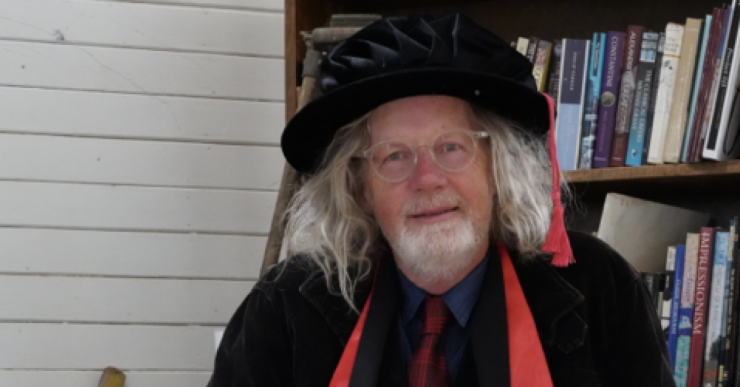Congratulations to Dr Lowen Clarke, who was recently awarded a Doctorate of Therapeutic Arts Practice from the Miecat Institute. Dr Clarke is an alumnus of the University of Divinity (Bachelor of Divinity, 1980). His doctorate explores the ‘lived experience’ of a picturebook and animation entitled ‘Sam the Tram’s Dance Club’, authored by Clarke. During his research journey, Dr Clarke pioneered ‘Empowerment Script’, a script format that he discovered can assist with PTSD and trauma. In an interview with the International Society for the Study of Trauma and Dissociation, he explains Empowerment Script (follow the arrows):
It > is > difficult > to > explain,
.show < to < simple < but <
The > eyes > make > complex > movements > as > they > read > words
.direction < other < the < in < then < and < direction < one < in <
It is a reading format that uses both hemispheres, and has resonance to EMDR. It causes bilateral stimulation, and can reduce SUDS [Subjective Units of Distress Scale]. The first book I published in this format is called ‘Sam the Tram’s Dance Club’. Being a children’s picturebook, it also combines color and a pleasant positive story with the reading experience.
I thought I came up with this in 2003, after having EMDR with a therapist. However, a search into my archives as a part of my doctoral research showed me that I first tried out a backwards sentence in 1974! That meant that when I wrote a complete forwards and backwards couplet in 2003 I already had the wherewithal to recognise what I had done, and know that this was something special. Having studied hypnotherapy, I spotted that there was a change in my breathing, and that it had potential. Use of Empowerment Script strengthened my hemispheric connections.
Because I fully believe that trauma can be overcome, I can be more relaxed about the steps-forward and steps-back nature of healing. It mirrors the strange slow movement forward in healing, and also the nature of writing.
Sam the Tram’s Dance Club is published by Unhooked Media.







Congratulations Dr Lowen Clarke.